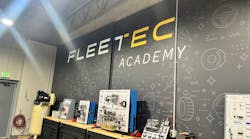With fewer moving parts, electric vehicles bring with them a promise of less complicated maintenance—but most technicians are yet to be trained and certified to work on the newer power technology. Cox Automotive Mobility is trying to change that.
FleeTec Academy is Cox Automotive Mobility’s technician education program. The 16-week program includes four weeks of truck and trailer preventive maintenance training at the FleeTec facility, six weeks running PMs in the field, and another six weeks back at the FleeTec facility for more apprentice-style learning. Those with and without mechanical experience, as well as those with no technician experience, can participate in the program.
See also: Cox Automotive highlights its top technicians' skills
The academy’s goal is to pump out 100 new commercial vehicle and trailer technicians per year, and it does this through an immersive process that takes a fraction of the time that other technician training facilities take; for example, Universal Technical Institute trains mechanics in 51 weeks.
Terry Rivers, senior manager of vehicle services training at Cox Automotive’s FleeTec Academy, said that once these technicians graduate, they stick around. The national average for technician retention is around 50%, but at Cox Automotive, it's 75%, he said.
One contributing factor to Cox Automotive’s technician retention is its continual training during and even after technicians graduate from the academy. That includes teaching EV service and repair.
See also: Simple things that can help with technician retention
Teaching EV service and repair
The industry faces new technology on a regular basis. This includes in-cab technology, emissions-reduction technology, and the shift to electric vehicles. Commercial vehicle technicians must be prepared for these changes. Rivers uses his personal car to illustrate the evolving industry.
“There are less computers in this building hooked to the network right now than there are in my car sitting out in the parking lot,” Rivers said. “There’s about 30 modules in my car, all multiplexed networked together, to control what comes out of that tailpipe and how that thing goes down the road.”
For electric vehicles, the number of modules is about half as much, but Rivers ensured there is a completely different skillset required to service EVs. “Although it might be less complicated, we have a lot left to learn,” Rivers stated.
See also: Adding new technology requires driver buy-in, communication
To accomplish this additional training required for servicing EVs and other alternative fuel technologies, FleeTec allows its technicians to go through FleeTec Honors, an advanced mobile training branch of the academy. As part of the program, FleeTec sends instructors into the field to teach new courses; each course takes technicians only two days to complete. Courses usually address common industry pain points, but Rivers mentioned that the training schedule for the past four months has consisted only of EV training.
Rivers said that 10% of this year’s FleeTec graduates have an EV certification, unlike last year, when there were no graduates with EV certification. Additionally, this year’s Cox Automotive Top Tech competition included an EV portion—a first for the event.
“We are prioritizing electric vehicle technician training and developing groundbreaking solutions to help our partners modernize their fleets,” Ted Coltrain, VP of operations, Cox Automotive Mobility Fleet Services, said.
Rivers explained the academy is also working to teach how to convert conventional engines to electric. This is important because greenhouse gases are emitted through vehicle production. If fleet owners convert existing fleet vehicles from ICE to EV at the end of the vehicle lifespan, they will eliminate the need for an OEM to produce a new vehicle.
Moreover, Rivers said the academy also has an OSHA-approved EV safety program, where safety instructors observe and ensure safe EV repairs and service.
See also: Preparing trucking to safely service electric vehicles
Technician certification
For Cox Automotive, its technicians, and FleeTec graduates, keeping up with new and emerging technologies in the trucking industry is a must. But it’s also just as important for Cox Automotive technicians to receive certifications, such as OEM and ASE certifications.
Rivers explained that only 10%—about 300,000—of all technicians in the industry have ever had a single Automotive Service Excellence certification. Roughly 67% of industry technicians who test for an ASE certification pass on their first try. Conversely, Rivers said 75% of FleeTec academy graduates pass the test—a testament to the quality of education Cox Automotive produces under Rivers and his team’s academy.
FleeTec Academy prides itself on being “the leader in fleets, overall,” according to Rivers. And with the knowledge and resources the academy provides to Cox technicians, along with Cox Automotive Mobility Fleet Services, the company is primed for continued growth.




